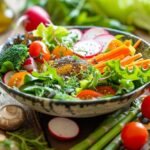Foods to Avoid for Optimized Geriatric Health should be closely monitored as part of an overall healthy diet. Foods high in saturated fat and cholesterol such as red meat and processed meats should be limited or avoided to reduce heart disease risk, while foods high in simple carbs like white bread, pasta and pastries could potentially cause sudden blood sugar spikes which increase heart disease risk further. Sugary snacks and beverages should also be limited or eliminated altogether as these could contribute to weight gain and overall poorer health outcomes.
1) Raw Eggs

Raw eggs should be avoided for optimal geriatric health as they contain Salmonella bacteria which has the potential to cause food poisoning, nausea, vomiting and diarrhea in elderly individuals. It is best to ensure you cook eggs thoroughly prior to consumption as this will prevent potential contamination issues from the eggs themselves as well as their shells being disposed of appropriately in your trash can.
2) Undercooked Meats
Undercooked meats can contain bacteria and parasites that can cause food-borne illnesses such as E. coli and Trichinosis. It is important to make sure that meats are cooked to the proper temperature to ensure that any potential bacteria are killed. The best way to make sure that meats are cooked properly is to use a food thermometer to check the internal temperature of the meat.
3) Deli Meats
Due to their high sodium and preservative levels, deli meats should be limited or avoided altogether due to their preservative content and processing with nitrates and nitrites that extend shelf life – but these preservatives have also been linked with colorectal cancer risks. Therefore, it would be prudent to limit or avoid their consumption altogether.
4) Raw Fish & Sushi

In order to maintain optimal geriatric health, both raw fish and sushi should be avoided. Raw fish contains parasites which can lead to serious health complications like food poisoning and anisakiasis; some types of sushi contain raw shellfish which could trigger an adverse reaction in certain people; it is best to limit consumption of such items altogether in order to stay healthy.
5) Sprouts
For optimal geriatric health, sprouts should also be avoided. They may contain bacteria such as E. coli and Salmonella that cause food poisoning; furthermore, some types of sprouts contain fungal toxins that could potentially pose serious health threats; to ensure optimal safety when eating sprouts it is recommended that they are cooked fully prior to consumption.
6) Unpasteurized Dairy (Soft Cheese) And Juice
Unpasteurized dairy and juice should also be avoided for optimal geriatric health, as it could contain bacteria or parasites which could potentially lead to illness. To stay on the safe side, always ensure your dairy or juice products have been pasteurized to eliminate potential contaminants.
7) Soda And Empty Calories
Sugary drinks should be avoided at all costs to prevent weight gain and other health problems. Sugary beverages contain many empty calories – calories that provide no nutritional benefit – that contribute to weight gain. In addition, such drinks can cause blood sugar levels to spike unexpectedly leading to health conditions like diabetes. It would be wiser to opt for healthier beverages such as water or unsweetened tea.
8) Alcohol

Alcohol should also be avoided to achieve optimal geriatric health. Alcohol can lead to liver damage, increased cancer risks, and an increased risk of falls, while too much alcohol consumption can also lead to dehydration resulting in dizziness and other serious side effects. It’s best to limit consumption or limit it entirely per day.
9) Hard, Tough Foods
Hard and Tough Foods Raw vegetables should also be avoided for optimal geriatric health as these hard and tough foods can be difficult to digest and lead to discomfort in digestion. Furthermore, some may cause irritation of the digestive tract leading to discomfort. It would be best to opt for soft foods instead which will be easier for senior digestive tracts.
10) Grapefruit
Also Refer:- Unveiling Surprising Health Benefits of Eating Kivi Fruit
Grapefruit should also be avoided to ensure optimal geriatric health. Grapefruit can interfere with certain medications, including statins and blood pressure medications, increasing their absorption rates thereby increasing risk for side effects. It’s best to speak to your physician prior to eating grapefruit.



